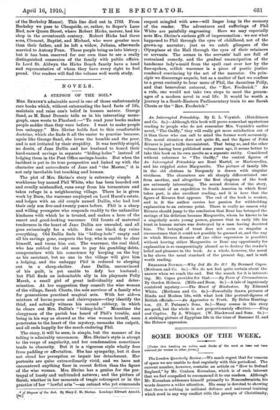NOVELS.
A STEPSON OF- THE SOIL.* MRS. SKEINE'S admirable novel is one of those unfortunately rare books which, without extenuating the hard facts of life, maintain and raise one's belief in human nature. George Sand, as M. Rene Doumic tells us in his interesting mono- graph, once wrote to Flaubert :—" To read your books makes people sadder than they were before. I want to make people less unhappy." Mrs. Skrine holds fast to this comfortable doctrine, which she finds-it all the easier to practise because, again like George Sand, she loves the humble and the poor, and is not irritated by their stupidity. It was terribly stupid, no doubt, of Jane Dallin and her husband to hoard their hard-earned savings in separate " hiding-holes " instead of lodging them in the Post Office savings-banks. But when the incident is put in its true perspective and linked up with the character and antecedents of Jane and "the Master," it is not only inevitable but touching and human.
The plot of Mrs. Skrine's story is extremely simple. A workhouse boy named Phil White, who has been boarded out and cruelly mishandled, runs away from his tormentors and takes refuge in a neighbouring village. There he is given work by Burn, the warrener employed on Lord Hurst's estate, and lodges with an old- couple named Dallin, who had lost their only son five-and-twenty years before. Phil is a sharp and willing youngster who responds readily to the unfamiliar kindness with which he is treated, and makes a hero of the smart and good-looking warrener. Old founts of maternal tenderness in the heart of Jane Dallin are unsealed, and all goes swimmingly for a while. But one black day ruins everything. Old Baffin finds his "hiding-hole" empty and all his savings gone, suspects the boy, who is unable to clear himself, and turns him out. The warrener, the real thief, who has robbed the old man to pay his gambling debts, compromises with his conscience by keeping on the boy as his assistant, but no one in the village will give him a lodging, and the unhappy Phil is reduced to sleeping out in a sheep-shelter. Jane Dallin, unconvinced of his guilt, is yet unable to defy her husband ; but Phil finds an indomitable ally in his playmate Polly Marsh, a small girl of great individuality and deter- mination. At her suggestion they consult the wise woman of the village, Sarah Clouts, the sole survivor of a family who for generations practised magical arts. With her aid—a mixture of hocus-pocus and clairvoyance—they identify the thief, and actually witness his second robbery, in which he clears out Mrs. Dallin's " hiding-hole." Meantime the clergyman of the parish has heard of Phil's trouble, and being in his way as shrewd as the wise woman herself, soon penetrates to the heart of the mystery, unmasks the culprit, and all ends happily for the much-enduring Phil.
The story, it will be seen, is simple, but the manner of its telling is admirably uncommon. Mrs. Shrine's style is abrupt to the verge of angularity, and her condensation sometimes tends to obscurity. But it is a vigorous style wholly free from padding or affectation. She has sympathy, but it does not cloud her perception or impair her detachment. Her portraits are quite extraordinarily vivid, and we have not encountered anything finer in recent fiction than the figure of the wise woman. Mrs. Shrine has a geziius for the por- trayal of lonely and unfriended natures ; and the picture of Sarah, whether in her moments of tragic retrospect or is the prictien Of her " lawful arts "—an outcast who yet commands 4'4:Stepson- of the Soil. B1 Mitrf.T. EC Shrine. Londc?s Edward Arnold. respect mingled with awe—will linger long in the memory of the reader. The adventures and sufferings of Phil White are painfully engrossing. Here we may especially note Mrs. Shrine's curious gift of impersonation: we see what happened to Phil through the eyes of childhood, not of the grown-up narrator; just as we catch glimpses of the Olympians at the Hall through the eyes of their retainers or servants. The scenes in the servants' hall are full of restrained comedy, and the gradual emancipation of the handsome lady's-maid from the spell cast over her by the fine-spoken, selfish warrener is a piece of poetic justice rendered convincing by the art of the narrator. On prin- ciple we discourage sequels, but as a matter of fact we confess to a great curiosity to hear more of Phil, the dauntless Polly, and that benevolent autocrat, the " Rev. Frederick." As a rule, one would not take two steps to meet the person. ages of a modern novel in real life. It would be worth a journey in a South-Eastern Parliamentary train to see Sarah Clouts or the " Rev. Frederick."














































 Previous page
Previous page